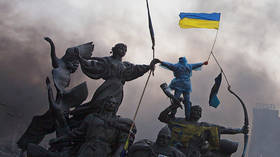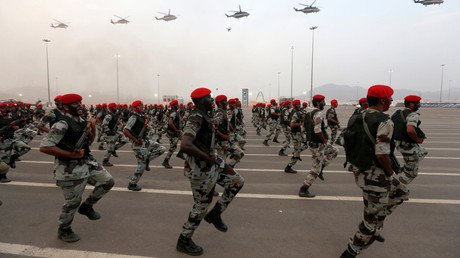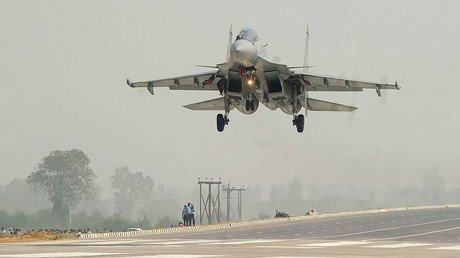Ukraine blames EU for bad integration pact, after ousting president who refused to seal the deal

Kiev has endured trade imbalances with most of its European partners, according to the latest data from the country’s statistics agency. Ukraine is still struggling to make its domestic products meet the rigorous EU standards.
In the first quarter of the current year alone, the overall trade deficit with the European Union totaled $535 million. Europe’s number one economy, Germany, contributed most to the ever-widening gap.
Ukraine signed the controversial association agreement with the EU five years ago, shortly after the Maidan revolution brought down the government of then-president Viktor Yanukovich, who had rejected the association deal. The political part of the agreement has been in effect since September 2014 and the economic part has de-facto operated from January 2016.
Also on rt.com World Bank ranks Ukraine as one of the poorest nations in Europe & beyondHowever, the country’s producers had to face the problem of quotas limiting the volumes of goods exported to EU countries. Ukraine may supply only 36 sorts of products duty-free and in limited quantities. Thus, the deal allowed the country to sell only an additional 3,000 tons of honey, 500 tons of wine, 650,000 tons of corn/corn flour, 7,800 tons of barley and flour, 4,000 tons of oats and some other products. After exhausting the quota, Ukrainian manufacturers may supply their goods to Europe with no trade benefits. The quotas are typically filled by the beginning of each fiscal year.
Earlier this week, Ukraine’s former economy minister Viktor Suslov accused EU officials of imposing “predetermined unfavorable terms” over Kiev, when signing the deal. The former state official highlighted the inability of Ukraine to compete with the EU member states when it comes to economics. Thus, the country accepted the terms of the agreement, which brought Kiev only quotas and restrictions, while opening the Ukrainian market to a limitless stream of European goods.
RT talked to analysts to find the logic behind Ukraine’s economic policy, which not only dragged down the country’s trade, but mired Kiev in enormous debts after breaking all ties with Russia.
“It was solely [former minister and president Petro] Poroshenko’s decision to break all ties with Russia and hastily tackle integration with Western Europe, even though European tech standards – such as ISO and DIN – greatly differ from those adopted in Ukraine and inherited from the Soviet Union,” Vladimir Rojankovsky, expert at the International Financial Center, told RT.
Also on rt.com Ukraine admits economy suffers dramatic losses thanks to anti-Russian policyThe expert explained that as far as the discreet behavior towards its new prospective member is concerned, Brussels should have explained to the new government of Ukraine all the intricacies of merging with European technological standards and should have advised on the necessary time to achieve partial then full compliance and integration.
“It was fairly possible to determine that such heavy machinery companies as Motor Sitch or, let’s say, the aircraft manufacturer Antonov – aren’t fit to sell their production to Western Europe or anywhere else except Russia in the nearest future,” Rojankovsky said. “Losing one market and not obtaining the other one is, apparently, a self-inflicted economic wound that should have been and must have been avoided by all means.”
Economists say that Ukraine’s economic performance has seriously worsened over the past years amid the constantly growing foreign indebtedness of the country. The overall internal and external debt, which has grown by $13 million during the period of financial cooperation with the International Monetary Fund, now totals 70 percent of the country’s GDP.
Also on rt.com Not Ukraine’s property: Russia's plan to revive huge Soviet-era aircraft irks KievAccording to senior analyst at Moscow-based investment bank BCS Premier Sergey Suverov, this figure has not reached a critical level so far, but is big enough to consider rejecting the fund’s austerity program and defaulting on the external debt.
“Default is not the best way out, of course, as such a step would evoke a sharp devaluation of the national currency and growth of inflation, further worsening living standards for average Ukrainian citizens,” the expert said, adding that defaulting could also cut the country off from external financial aid for many years.
Loans obtained by economically challenged states such as Ukraine from various international organizations are not aimed at lifting such countries out of poverty, Maria Salnikova, chief analyst at investment consultancy Expert Plus, told RT.
“The IMF’s tactic is to impose loans and live on credit interest. There’s not a single reason for getting the next tranche, apart from the fact that Kiev will need cash to pay $2 billion to cover the previous loan,” the economist said, stressing that Ukraine is “digging itself” into complete indebtedness with no prospect of improving its position in an international arena or creating a better standard of living domestically.
Also on rt.com Ukraine sues Gazprom over ‘anticompetitive practices’ to retain earnings from transit of Russian gasThe very decision to cooperate with the IMF was really wrong-headed, as the Ukrainian authorities were definitely led not by national interests but by the understanding that their time at the helm is limited, according to Denis Lisitsin, Aerarium Group’s asset management director.
“If a state bears less and less expenses connected to supporting social needs and trade balances, the IMF imposes bigger loans, and thus bigger loan interests,” Lisitsin said, stressing that the IMF commonly forces its borrowers to implement austerity policies by cutting government spending, increasing public tariffs and gradually abolishing subsidies and social programs.
The economist highlighted that, against all odds, the key economic element of any plan to enrich the Ukrainian budget remains cooperation with neighboring Russia.
For more stories on economy & finance visit RT's business section














